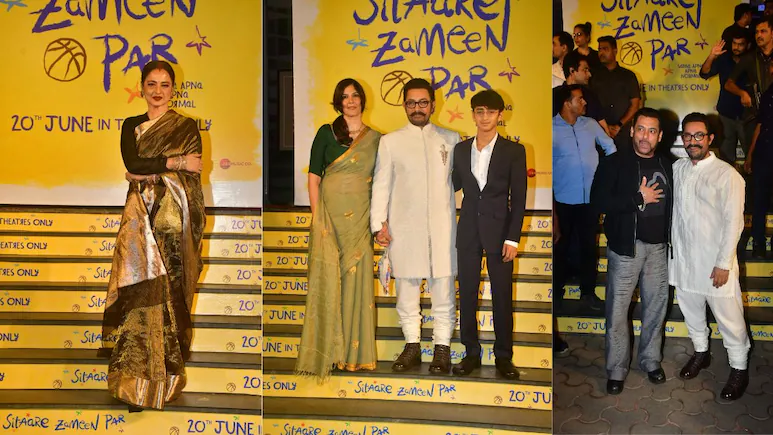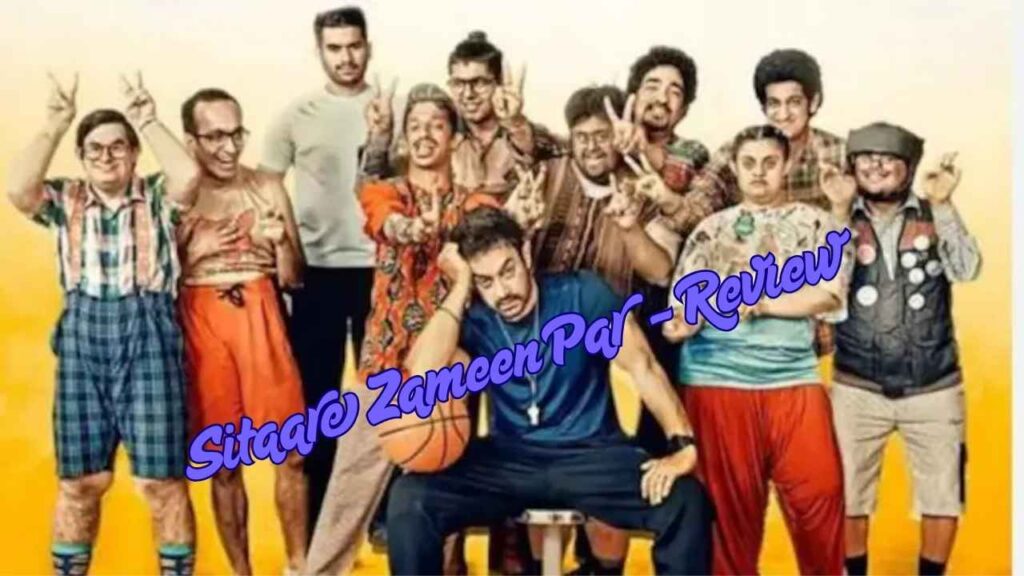Uplifting Sports Drama Celebrates Neurodiversity, Anchored by Ten Debutant Actors and Aamir Khan’s Nuanced Role.
Sitaare Zameen Par Review

Aamir Khan’s return to cinema with Sitaare Zameen Par, released on June 20, 2025, delivers a poignant and entertaining sports drama that places inclusion and neurodiversity at its core. Directed by RS Prasanna and scripted by Divy Nidhi Sharma, this official remake of the 2018 Spanish film Campeones blends humor, emotion, and the resilience of the human spirit to craft an inspiring narrative. While the story treads familiar ground, the film’s exceptional performances—particularly by its ten neurodivergent debutant actors—and its sincere advocacy for diversity elevate it into a meaningful cinematic experience.
The film centers on Gulshan, portrayed by Aamir Khan, a temperamental basketball coach grappling with personal and professional setbacks. Suspended after a violent outburst and sentenced to community service for drunk driving, Gulshan is tasked with coaching a team of ten neurodiverse adults. Initially reluctant, he finds himself transformed by the team’s tenacity and spirit, learning as much from them as they do from him. The narrative, set against the backdrop of a physically demanding sport, underscores themes of redemption, teamwork, and societal acceptance, echoing the emotional resonance of Aamir’s 2007 classic Taare Zameen Par, to which this film serves as a spiritual sequel.
Aamir Khan slips effortlessly into Gulshan’s role, portraying a man whose short stature and bruised ego make him both flawed and relatable. His performance balances intensity and vulnerability, ceding space to his co-stars without overshadowing them. Genelia Deshmukh, as Gulshan’s supportive wife, and Dolly Ahluwalia, as his pragmatic mother, provide emotional depth, while Brijendra Kala adds comic relief. However, the film’s true strength lies in its ten debutant actors—Ayush Bhansali, Ashish Pendse, Simran Mangeshkar, Gopi Krishnan Varma, Vedant Sharma, Rishab Jain, Aroush Datta, Samvit Desai, Rishi Shahani, and Naman Mishra—whose authentic and organic performances breathe life into the story. Each actor, portraying characters with distinct personalities and challenges, shines in scenes that feel refreshingly unscripted, from Simran Mangeshkar’s fiery Golu Khan to Vedant Sharma’s introspective Bantu.
The film’s pacing occasionally falters, with predictable plot beats inherent to the sports drama genre, but its emotional sincerity and vibrant energy compensate for these shortcomings. Shankar-Ehsaan-Loy’s music, paired with Amitabh Bhattacharya’s lyrics, enhances the film’s uplifting tone, while Prasanna’s direction ensures the narrative remains engaging without resorting to overly manipulative tactics. The basketball sequences, though not as polished as Hollywood counterparts, capture the team’s growth and camaraderie effectively.
Sitaare Zameen Par stands out for its bold representation of neurodiversity, going further than most Indian films in showcasing intellectual disabilities with authenticity. Unlike earlier efforts like Ahaan (2019), Rainbow Jelly (2018), Jalsa (2022), or Chotoder Chobi (2014), which featured actors with disabilities in limited roles, this film places its neurodivergent cast at the forefront, challenging societal stigmas about “normalcy.” The actors’ performances, honed through rigorous preparation, add genuine depth to the film’s message that differences are not deficits but unique strengths.
Produced by Aamir Khan Productions, Aparna Purohit, B Shrinivas Rao, and Ravi Bhagchandka, the film carries a U/A 13+ certification with minor edits, including a disclaimer featuring a quote from Prime Minister Narendra Modi. While some early reviews have called it a predictable remake, others, including News18’s three-star rating, praise its “celebration of neurodiversity.” With advance bookings at ₹1.6 crore, the film’s box office success will hinge on word-of-mouth, but its social impact is already evident, amplified by endorsements from figures like Sachin Tendulkar, who lauded its blend of humor, emotion, and unity.
Related Coverage
Aamir Khan’s Cinematic Comeback
After the underwhelming Laal Singh Chaddha (2022), Aamir’s return with Sitaare Zameen Par reaffirms his commitment to socially relevant storytelling, opting for a theatre-only release to preserve the cinematic experience.
Breakthrough Performances by Debutants
The ten neurodivergent actors, cast through a meticulous selection process, deliver performances that mark a milestone in Indian cinema’s portrayal of disability, earning praise for their authenticity.
Bollywood’s Embrace of Inclusion
The film’s focus on neurodiversity aligns with a growing trend in Indian cinema to address underrepresented communities, following films like Margarita with a Straw (2014) and Ahaan (2019).
Sports Dramas in Indian Cinema
Sitaare Zameen Par joins the ranks of successful Indian sports dramas like Dangal (2016) and Chak De! India (2007), using athletics as a metaphor for overcoming societal barriers.
Why This Matters
Sitaare Zameen Par is more than a feel-good film; it’s a powerful advocate for neurodiversity, challenging stereotypes and fostering empathy through its authentic casting and heartfelt narrative. Aamir Khan’s return, coupled with the debutants’ standout performances, reinforces Bollywood’s potential to drive social change. The film’s theatrical release, amid the dominance of streaming platforms, underscores the enduring value of shared cinematic experiences, while its message of resilience and inclusion resonates universally.
Stay Informed
As Sitaare Zameen Par plays in theatres, its cultural and commercial impact will unfold. Follow our coverage for updates on audience reactions, box office performance, and the film’s role in advancing inclusive storytelling.
Sources
- NDTV, June 20, 2025
- News18, June 20, 2025
- The Indian Express, June 20, 2025
- Times of India, June 20, 2025
- India Today, June 20, 2025
Disclaimer
The information in this article is based on verified reports from credible sources as of June 20, 2025. Details regarding the film’s reception may evolve as new reviews and audience feedback emerge. Opinions expressed in reviews or by individuals do not necessarily reflect the stance of this publication. Readers are encouraged to consult multiple sources for a comprehensive understanding of the film and its impact.
